By: Emily Featherston, Lee Zurik and Jamie Grey
(InvestigateTV) – For many families, the pandemic-induced extended spring break in March 2020 was the beginning of the end of their relationship with traditional schooling.
The U.S. Census Bureau estimates the number of families homeschooling their school-age children grew 5.6% from the spring semester to the fall of 2020 – to roughly one in 10 families choosing to educate at home.
Some of those families decided to homeschool the traditional way, with parents shouldering the entire responsibility and cutting ties entirely with public school systems.
Others found a new path: the growing industry of “bridge” programs designed to give parents the flexibility and choice afforded by homeschooling, but with the backing of a school district – including some of the financial support.
However, both public education and homeschooling advocates are questioning these programs – particularly the mingling of millions of public education dollars with home learning environments and private companies.
Critics take issue with these models allowing families to purchase 3-D printers, zoo memberships, streaming services and other items using taxpayer money, while at the same time putting parents in the driver’s seat when it comes to curriculum and instruction.
In reviewing hundreds of emails, contracts and other public records, InvestigateTV found in many cases the innovative nature of these programs has left state education departments scratching their heads over how to handle them – and traditional school districts balking at the reallocation of resources.
‘I thought that it would be a good opportunity’
Around 850 students occupy desks in Oneida School District buildings – the type of student population Jon Abrams said he expected to find when he joined the Idaho district as superintendent in July 2021.
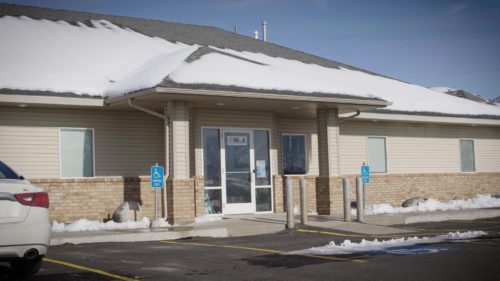
The Idaho Home Learning Academy is located in Malad City, Idaho, but serves students across the state. Source: Owen Hornstein, InvestigateTV
What was unexpected, he said, was that the district on the more rural eastern side of the state in a county with just under 4,700 people total runs an online school with thousands of students.
“I was coming thinking I was coming more to a brick-and-mortar experience, which I was used to. And the IHLA (Idaho Home Learning Academy) school, it’s a beast all of its own,” Abrams said in an interview with InvestigateTV.
The Idaho Home Learning Academy, described by the district as an “online public school,” serves students across the state from its Malad City, Idaho Headquarters.
The school saw roughly 6,100 students enroll for the 2021-2022 school year, but Abrams and IHLA Executive Director Terri Sorensen said that number was closer to 7,200 at the height of the pandemic.
Those students are enrolled as Oneida School District public school students, but the vast majority get their education from Utah-based Tech Trep Academy, which IHLA began contracting with during the 2016-2017 school year, with a few hundred utilizing Harmony Educational Services, also based in Utah.
“I thought that it would be a good opportunity for our district,” said former superintendent Rich Moore, who retired at the close of the 2020-2021 school year. “We had stagnant enrollment. We felt that it might … be a benefit to our brick-and-mortar students. Second, we felt that families who had made the choice to school at home, they would have an increased opportunities for quality resources to help their children learn. And third, we kind of we’re, we like innovation and being on the leading edge of doing good things in education.”
Tech Trep Academy operates in five states, with its sister organization and predecessor My Tech High operating in two more.
According to the Tech Trep Academy website, founder Matt Bowman and his team decided to launch the program in 2008 “to create an online public school program for kids that would teach both high-tech skills and entrepreneurship principles.”
Tech Trep Academy declined InvestigateTV’s requests for an interview, instead sending an emailed response to general topics raised during those requests. An additional request for comment on specific items did not receive a response.
While the specifics of contracts vary state to state, Tech Trep Academy has a general model:
- Students are enrolled as public school students with the school district under contract with Tech Trep Academy
- In many cases, students are not required to be a resident of the school district Tech Trep Academy works with – though some districts, such as Putnam County in Tennessee, have chosen to limit enrollment to certain county residents.
- The district receives per-student funding from the state for that student and in turn pays Tech Trep Academy an agreed upon percentage of that per-student amount. Families of enrolled students are then given a stipend by Tech Trep Academy – in most states $1,700 per year – to purchase educational materials, either by ordering through the company or through reimbursements.
- Once enrolled, families are assigned to a “homeroom teacher” who acts as the primary liaison between the family and Tech Trep Academy. The teacher is responsible for monitoring student progress by reviewing learning assessments submitted by the students, and is available to the family for any academic support needed.
- Families can use whatever curriculum they choose, though Tech Trep Academy offers its own options, some free or discounted and some available for purchase using the family’s funds.
- At the end of the year, students are required to complete state-mandated testing just as brick-and-mortar students are.
According to the written response sent by co-founder Frantz Belot, Tech Trep Academy and My Tech High now serve over 18,000 students across both programs.
The amount Tech Trep Academy or My Tech High receive from each school district depends, because per-student funding from each state and the agreed upon percentage varies.
InvestigateTV requested payment records from school districts under contract with Tech Trep Academy and My Tech High during the 2020-2021 school year. While some districts did not respond prior to publication, analysis of the records that were returned showed that combined, the two companies were paid at least $45 million in public funds from July 1, 2020 to June 30, 2021.
There are other companies that provide similar services to Tech Trep Academy – some that even work within the same districts, such as Harmony Educational Services, which is also under contract with IHLA back in Idaho. According to documents reviewed by InvestigateTV, Harmony has pitched its services to some of the same districts as Tech Trep Academy.
IHLA director Sorensen said the program was already growing quickly before COVID-19 came knocking, but she and her staff think the upheaval pushed things even further.
“There were a lot of parents that came to IHLA because they were nervous about the pandemic. They didn’t want to send their kids back. I think a lot of them stayed because it was a good fit for them,” she said.
The significant growth in the program and those like it is not a positive indicator for everyone, however.
‘I would go beyond unfair’
Kylene Varner and her husband became aware of Tech Trep Academy in July 2020, when the company was set to partner with Middlebury Community Schools in Indiana.
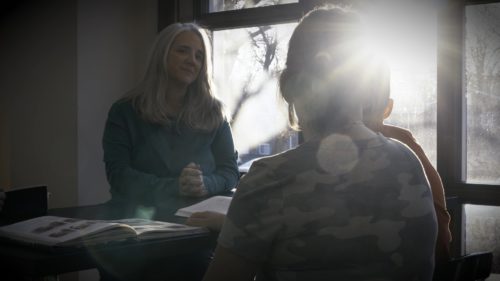
Kylene Varner sits with her children as they complete their schoolwork.
Source: Owen Hornstein, InvestigateTV
Varner, a Zionsville, Indiana resident who homeschools her children and is part of the Indiana Association of Home Educators, said the proposed program came up in conversation in her homeschooling community.
“It was initially brought to me as someone saying, ‘Hey, this is a school program where I can get money for educating my kids, and I can still homeschool them,’” she said.
She said the concept seemed odd, so she began looking into it and researching the company along with Indiana education statutes.
“And when I looked at it, it was clear, it’s not a homeschooling program,” she said.
While “homeschooling” and similar phrases appear throughout Tech Trep Academy’s websites and marketing materials – including emails obtained by InvestigateTV showing Tech Trep Academy purposefully seeking out “influential homeschool families” to target for its Tennessee program – students are legally considered public school students.
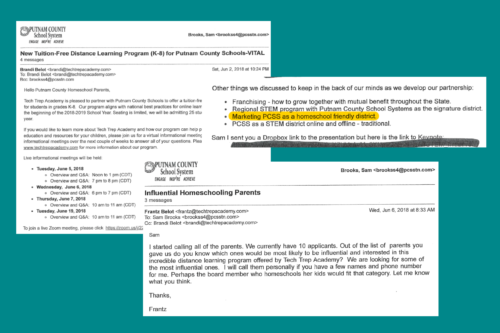
Emails obtained by InvestigateTV show examples of both district and Tech Trep Academy personnel referencing homeschool families, and how to reach them.
Source: Graphic by InvestigateTV
Varner said in Indiana this is an important distinction, because there are specific rules for public schools for how long and by whom students are taught, how curriculum is approved and how funds are disbursed.
Based on the state code, she said she began to question whether Tech Trep Academy was operating within those rules.
“As a taxpayer, that’s offensive,” she said.
Tech Trep Academy did see pushback from the state in Indiana – the program originally offered the per-student stipend of $1,700 the same way it does in other states, but the state determined this went against a prohibition against enrollment incentives. In response, Tech Trep Academy began administering the stipend using “points” and purchasing items for families directly.
Of particular concern, she said, is the way parents are allowed to purchase or be reimbursed for a wide variety of items that traditional public-school students may not have access to in the classroom or be allowed to take home, such as telescopes, 3-D printers, model train sets and gardening tools.
The funds can also be used on less tangible things in the name of education, such as Netflix, Amazon Prime, Disney+ and Hulu subscriptions, participation in dance or karate lessons, and as passes to aquariums or museums.
Documents posted in Tech Trep Academy’s online parent resources include a running list of approved items, including hoverboards, American Girl dolls and more, and social media posts by parents in the program also show the variety of items purchased using the funds.

Facebook posts from parents show the variety of items available to be purchased with the funding provided through Tech Trep Academy. Source: Graphic by InvestigateTV
In an informational video conference for parents, a recording of which was provided to InvestigateTV by a participant, Tech Trep Academy Director of Operations Janet Cox explained she uses the funds to purchase educational items she gives to her children at Christmas or on their birthdays as a reward for completing their work.
In an email to InvestigateTV, Cox said her children are more engaged with certain texts when presented this way. For example, she said, over the holidays her fourth grader received a book she planned to use in the spring about the Jurassic period and used his break time to explore the subject in depth.
“That same book, presented differently, would not have generated the same enthusiasm and learning,” she said. “He would have read the required 1 chapter a day, answered some comprehension questions, without the excitement I saw demonstrated over Christmas Break.”
She also expressed her support for the overall model.
“My goal for all students enrolled in Tech Trep Academy is to spark a love of learning while still teaching them the skills and information they need to be successful. Educators in all types of schools often collaborate and share ideas to help motivate and encourage student engagement,” she said. “The short video clip from the informational meeting was just one idea on how parents, as learning coaches, could help motivate and encourage student learning at home.”
[You can read her full response here or at the bottom of the page]
For Varner, the focus on flexibility isn’t enough to overcome her concerns about equity.
“I believe that it’s actually discriminatory, I would go beyond unfair,” Varner said.
Varner pointed to the fact traditional students of Cloverdale Community Schools – the district Tech Trep Academy currently works with in Indiana after Middlebury decided not to continue the relationship – aren’t receiving these items or access to these platforms as part of their enrollment.
“I don’t understand what makes this particular set of students special,” she said.
In an emailed response to InvestigateTV, Cloverdale superintendent Greg Linton said:
“Students learn in many different ways. Some students thrive in traditional public schools while others learn better through documentaries, hands-on activities, or other alternative means. Technology and outside the box thinking allow us to provide a quality education to students in the ways they learn best. Students are still accountable for learning and are provided with the resources and support to become successful lifelong learners.”
But Varner said she also thinks it’s a misappropriation of public money, because unlike public schools, families are not required to get board approval for purchases, buy in bulk and equitably distribute resources.
“State education resources are not to be spent on personalized items,” she said.
Jenny Robinson, vice chair for the Monroe County chapter of the Indiana Coalition for Public Education, said she has similar qualms with the overall model Tech Trep Academy and similar companies use.
“We have this public obligation to our community to provide an equitable education to all students in a community. And so to do that, we have to pool public resources, and we have public school boards and administrators who are trying to distribute these resources fairly,” she said “And here … we suddenly have this bizarre set up, where an individual family can get products for their home with public money.”
In a phone interview with InvestigateTV, Shawni Carver, the national program director with Harmony Educational Services, said they view their version of the parent stipend as extending the opportunities available to traditional public school students to those who school at home.
“When you think about going just to public school, like all the stuff that they had in your biology class, for you to do dissecting – all the tools and the mice and the telescopes and the microscopes … those are the same things that are available to homeschool kids through their funding,” she said.
Carver acknowledged the concern about fairness, but she said they view their model as a way to provide opportunities and more access to public dollars.
“I see what you mean ‘it’s not fair,’ this and that, but it’s not fair either that the funding, if someone decides to homeschool and they check the box, they get no funding at all unless they’re involved in a program like Harmony,” she said. “The funding should follow the students, but the way that the government has it set up is, it doesn’t.”
‘Someone should be concerned’
In addition to the financial aspect, Robinson and Varner, the advocates in Indiana, raised concerns about the quality of the education students participating in these “bridge” programs are receiving and the amount of oversight certified education professionals have over the programs.

Rich Moore retired from the Oneida School District as superintendent at the end of the 2020-2021 school year. Source: Owen Hornstein, InvestigateTV
While Tech Trep Academy, Harmony Educational Services and others partner with public school districts and provide access to certified teachers, either through designated “homeroom” teachers or through available online curriculums, in many cases the bulk of day-to-day instruction is overseen by parents.
Moore, the former Oneida superintendent, said the amount students and parents interact with a certified teacher varies, with the amount depending on how much support the family needs.
“If they are not making adequate progress, there’s more intervention that is provided,” he said, “but if the student is meeting and mastering those standards, and they are making adequate progress forward, then they will have less interaction with that certified teacher. But they still have access and interaction with that certified teacher.”
He said one of the primary goals of the Idaho Home Learning Academy is to provide flexibility.
“I think that students should have the choice to learn that meets their learning need,” he said.
Critics like Robinson say that for public school students, there needs to be more involvement.
“They’re not receiving an education with community oversight, and with a degree of professional oversight,” she said. “And I know that Tech Trep [Academy] claims to provide some of that, but I think it’s really, really loose and very distant, physically distant. So I think there really is a question of the basic protection of a high quality education for kids.”
Robinson and others point to state test scores they say indicate students in these programs are not getting the education they need.
According to Idaho State Department of Education data, IHLA students in Oneida County underperform on the Idaho Standards Achievement Test compared to the rest of the state. In spring 2021, only 33% of IHLA students were proficient or higher in mathematics, compared to the state average of 40%. Scores were close to the average in English Language Arts, though the school was still more than 12% behind the state on for the Idaho Reading Indicator.
“We’re not the highest and we’re not the lowest. It’s something we work on a lot,” said Sorensen, the IHLA director.
She and the other leaders at the school said they are more focused on how each student progresses over the course of the year, and it’s difficult to compare IHLA students to traditional students because some may have been tested for the first time.
“There’s a tendency to want to lump it all together,” current Oneida superintendent Abrams said, “but I think in order to really be successful, you have to look at the growth of the individual student. And we’re working on doing that.”
Public records reviewed by InvestigateTV indicate state testing has been an issue for school districts working with Tech Trep Academy in other states as well.
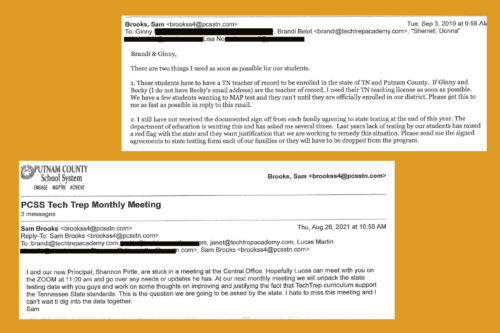
Emails between Putnam County Schools and Tech Trep Academy personnel show conversations about state testing. Source: Graphic by InvestigateTV
In Putnam County, Tennessee, the school district ran into an issue with the state after students participating in its partnership with Tech Trep Academy didn’t complete the annual testing.
“Last year’s lack of testing by our students has raised a red flag with the state and they want justification that we are working to remedy this situation,” said Sam Brooks, the district’s personal learning supervisor, in a September 2019 email obtained by InvestigateTV.
Nearly two years later, an August 2021 email from Brooks to Tech Trep Academy staff said the group needed to go through the latest state testing data “and work on some thoughts on improving and justifying the fact that Tech Trep curriculum support the Tennessee State standards,” because the state was going to ask.
According to Spring 2021 testing data from the Tennessee Department of Education, of third through fifth grade students at Putnam County VITAL (Virtual Instruction to Accentuate Learning) – which contracts with Tech Trep Academy only 21.4% of tested students were on track or had mastered English Language Arts, and just 8.6% were on track or had mastered mathematics.
Dan Rader, attorney for the Putnam County Board of Education, responded to an InvestigateTV request for comment from the district, explaining there was “confusion” in the beginning of the program and the expectation from the state for students in the program to complete testing, which he said has been rectified since.
Regarding the test scores, Rader said: “While these are low numbers, our hope is through this program our homeschool students who were not being tested in the various grade levels through their own methods of homeschooling will be tested through our program and if/when they choose to re-enter our regular schools, they will have the opportunity to be on grade level and have state testing experience, should they decide to return to our traditional schools.”
The written response to InvestigateTV from Tech Trep Academy included a reference to state testing: “Prior to any required state testing window throughout the year, the partner district ensures the all state testing proctors are trained and scheduled appropriately to administer all required assessments. At the conclusion of the various state testing windows, the partner district conducts a full and comprehensive audit to ensure that 100% of the students participating in the My Tech High / Tech Trep Academy Program have completed the state test requirements.”
Carver, with Harmony, said they’ve found their students perform adequately on required state testing.
“Our statistics show that most Harmony students test at the same or even better than brick and mortar students,” she said.
Still, as a former educator, she said test scores in general should be taken with a grain of salt.
“It’s an indicator of how they’re doing, but I think there’s a lot of other factors that maybe are not measured that you have to take into consideration,” she said.
States struggle with how to handle model
Given the attention from education-focused media Tech Trep Academy has received in Idaho and Indiana and its position as one of the leaders of the model, InvestigateTV requested emails and other public records from the state education departments in states where Tech Trep Academy is active.
In some cases, state-level officials were not aware of Tech Trep Academy, My Tech High, Harmony or similar programs until after school districts were already working with them.
In January 2020, a citizen submitted a public records request to the Colorado Department of Education regarding My Tech High and the school district in Vilas, Colorado.
Staff from both the Schools of Choice Unit and Office of Blended and Online Learning were unfamiliar with My Tech High when the request came in.
As the state became familiar with the program, however, some officials began to express concern.
“This program is very sophisticated in its design and is able to offer homeschool families a range of resources and supports; however, it currently operates in Colorado in an extremely grey area and is very vulnerable to the impact of even minor policy changes/clarifications,” wrote Bill Kottenstette, executive director of the state education department’s Schools of Choice Unit, in a May 3, 2021 email.
Kottenstette goes on to explain he understands why the option is attractive to parents concerned about the pandemic, estimating about 2,000 students were involved at the close of the 2020-2021 school year.
“They are offering something innovative and compelling. On the flip side, I don’t know if what they’re doing is legal and so I don’t know whether we should move our policies in a way that would tacitly acknowledge what they are doing as okay. I also think that’s why I haven’t received a specific concern about the model – b/c (because) they probably don’t want us looking too close at what they’re doing :-/,” he wrote.
In an interview with InvestigateTV, Kottenstette said based on existing statutes, the state landed on considering My Tech High participating students as “part-time” public school students – a designation that affects the percentage of per-student funding the school gets on their behalf.
“So within this, the department’s context is students that are taking courses through My Tech High are being submitted to the state for part time funding, so we view them as part time students,” he said.
School districts using My Tech High and similar organizations have been issued “variances” by the state to continue the relationships, but Kottenstette said the issue has led to conversations at the state level that are ongoing about the future of such models.
“Especially post COVID, we’re seeing a range of educational approaches that are being implemented, where the policy structure is not clear,” he said. “I’d say, generally speaking, schools or districts are operating in an okay space. But I think that as new versions of models come out, that it could be worthwhile for policymakers to look at, reassess the existing policies and structures to determine whether some of these new versions should be intentionally written in, or if they’re saying ‘Actually, we did not intend for those types of structures to exist.’”
Similar concerns to Kottenstett’s appear in emails between state education officials in Utah, where My Tech High, Tech Trep Academy and Harmony Educational Services are all based.
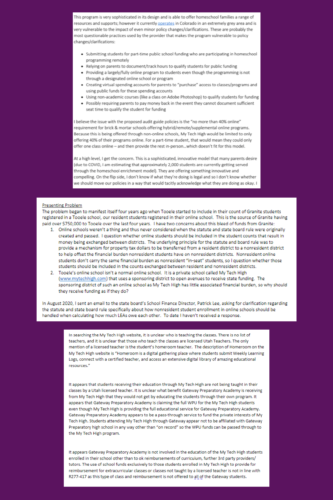
Emails from state-level education officials show discourse about if and how homeschool-public school bridge programs fit within state codes. Source: Graphic by InvestigateTV
In response to a question from an internal auditor in October 2021, Utah State Charter School Board investigator and remediation specialist Greg Connell said My Tech High came up during research into a compliance complaint.
He shared his research into the issue of whether students were receiving instruction from a certified teacher and the legality of state funding being passed on to families through a third party.
“It appears that students receiving their education through My Tech High are not being taught in their classes by a Utah licensed teacher,” Connell wrote in his research notes.
According to the company website, My Tech High, like Tech Trep Academy, provides a “homeroom” for students to connect with a certified teacher, then offers three options for how the remainder of subjects are programmed: a “direct course” using the curriculum available through the program, a “custom-built course” where parents are given the “freedom to create personalized learning experiences” and a “third party course” where students register with a live online or in-person course for a particular subject or elective.
In his notes Connell summarized: the school district “appears to be a pass-through service to fund the private interests of My Tech High.”
Connell also questioned the funding mechanism: “The use of school funds exclusively to those students enrolled in My Tech High to provide for reimbursement for extracurricular classes or classes not taught by a licensed teacher is not in line with R277-417 as this type of class and reimbursement is not offered to all of the [district’s] students.”
Leadership at the State Charter School Board told InvestigateTV that because My Tech High is not a charter school, the office is not in a position to make any kind of determination about the program or the overall model.
The state audit department, on the other hand, is in the process of an internal audit looking at education service providers. The audit was approved by the Utah state board in October 2020 and expected to be complete by late spring 2022.
Auditors are looking at the “use of Education Service Providers, particularly questions associated with procurement and provision of these services, in context of current laws and rules.”
Pulling from other districts
The audit team’s October 2021 discussion of My Tech High happened a few months after a request from Granite School District to re-evaluate the Utah statute regarding student residency.
Granite, which serves Salt Lake City proper and is next door to Tooele County School District which contracts with My Tech High, claimed Tooele’s contracts with My Tech High had cost Granite more than $750,000.
In Utah, if a student attends a school in a district other than where they physically reside, what would be their home school district is required to pay the district where they are enrolled “1/2 of the amount by which the resident district’s per student expenditure exceeds the value of the state’s contribution.”
“The sponsoring district of such an online school as My Tech High has little associated financial burden, so why should they receive funding as if they do?” the email said.
State officials and a couple state board members met with Granite over the issue in June 2021, and in an email following that meeting discussed the best way to handle the situation. In that thread, a finance official remarked that “the online piece likely needs to be readdressed” but that the state should get input from other districts before moving forward.
InvestigateTV reached out to Granite School District, but a spokesperson said the district had no further comment on the matter.
In Idaho, superintendent Abrams argues the idea of school districts being relegated to geographic boundaries is something the industry is moving beyond.
“Our main objective right now is to educate every student that is enrolled in our school district,” he said. “And the state rules allow us to educate those who aren’t living in this area, and we take that responsibility very seriously.”
The future
The homeschool-public school bridge program model appears to be growing.
My Tech High announced in early January it will be offering a statewide Kindergarten through fifth grade “pilot program” in Oregon.
Harmony also plans to grow, Carver, the national director, said, noting that the pandemic lasting longer than many originally anticipated has pushed the conversation about school options further.
“A lot of schools just kind of made-up stuff to kind of make it through the times, but it’s still happening, and so a lot of schools are kind of like, ‘Hey, maybe we do need some professional help to streamline this so that we can maintain our enrollment,’” she said. “So I’d say we’re on the grow.”
What that means for the future of education is something state education officials said they have top of mind.
“We definitely want to encourage policymakers to say, ‘Where do our values lie?’ and ‘Where do we, you know, support flexibility? Where do we want to encourage innovation? And where do we want to have sufficient guardrails in place to ensure that students aren’t falling through the cracks?’” said Kottenstette, the schools of choice department director in Colorado.
His colleague, Colorado’s executive director of School District Operations Kate Bartlett, said the same goes for the financial side of things.
“The other lens that I think about in the context of those big questions is how do we ensure that funding continues to be distributed in a manner that is fair and equitable, and sort of correlated to the instructions that the student is receiving and the resources that that takes to deliver quality outcomes?” she said.
Those questions are already coming up in state houses across the country. The National Conference of State Legislatures found of the 120 bills related to school choice filed in 37 states, more than 30% involved “education savings accounts” – mechanisms allowing state funding to be used by families directly for education expenses.
It’s a trend critics Robinson, with the Indiana Coalition for Public Education, said they are concerned about.
“Instead of committing to this basic experience, where we have math and science and social studies, and music, and art and physical education, that instead, we hand parents a chunk of change,” she said.
She said she fears it will only increase disparities in education funding and quality.
“There will be people who already have plenty of resources, who can already send their kids to private school, who can maybe then supplement with that money,” she said, “and then there will be other people who will really be stuck with just an inadequate amount of funding and an inadequate amount of knowledge really, to educate their children well.”
Kayan Tara, Laura Gerber, Nadia Scharf, Lauren Ulrich and Lily Wray provided research assistance for this report. All are from the Arnolt Center for Investigative Journalism at Indiana University, a partner of InvestigateTV.
Full response from Janet Cox, Tech Trep Academy Senior Director of Operations regarding her comments on giving her children educational materials at Christmas and on their birthdays:
My children are enrolled in the Idaho Tech Trep Academy program. One of my goals for my 4th and 5th graders this year was to help them develop a true love of reading. One of the items I purchased was a set of Boxcar Children books which were wrapped up and given to my children for their August birthdays. They see them as their books and they jumped in excitedly to read them. After they finish a book, I have them do a reader response activity about the book (create a 3-D model of a scene from the book with an oral presentation, write a book report, create a visual retelling of the story using storyboards, powerpoints, or posters) After they finished the set of 30 boxcar children books, they “earned” 3 new books of their choice. This same activity is used in different ways in regular brick-and-mortar settings with teachers gifting books for their student’s birthdays or special events.
I also like to teach some of our science and social studies through a variety of books, including regular non-fiction, primary source documents, traditional textbooks, documentaries, and historical fiction. One of our sources this year included the “Who was” and “What was” series which are biographies and informational books (For example, “Who was Albert Einstein” and “What was the Jurassic Period.”) I purchased these in November to use during our second-semester learning. I wrapped them up with the other Christmas presents and my kids see their “textbooks” as something fun and exciting. They started reading them over Christmas break for fun. My 4th grader chose the “What was the Jurassic Period?” book and spent hours over Christmas break researching different dinosaurs, creating a diorama, creating food webs, making his own “trading cards” and using them for a matching game with siblings. That same book, presented differently, would not have generated the same enthusiasm and learning. He would have read the required 1 chapter a day, answered some comprehension questions, without the excitement I saw demonstrated over Christmas Break.
My goal for all students enrolled in Tech Trep Academy is to spark a love of learning while still teaching them the skills and information they need to be successful. Educators in all types of schools often collaborate and share ideas to help motivate and encourage student engagement. The short video clip from the informational meeting was just one idea on how parents, as learning coaches, could help motivate and encourage student learning at home.
We live in an amazing time where there are so many ways to learn things! We need to stop making education something that is endured and make learning into something kids are excited about. Tech Trep Academy does an amazing job in helping parents present learning opportunities to students in ways that make it so they become engaged in the learning process and become lifelong learners.


